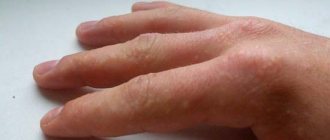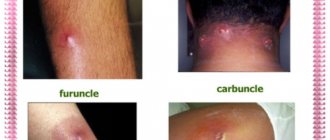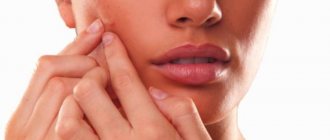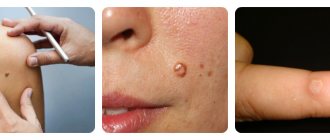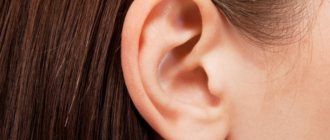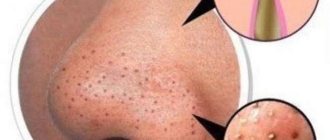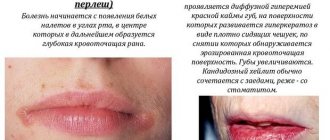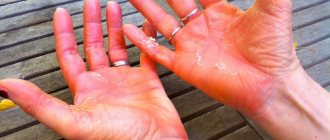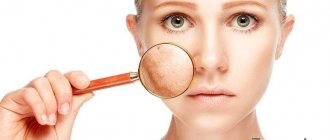Increased sweating, also known as hyperhidrosis, plagues a person not only during the day, but also at night. Both men and women face this pathology. Hyperhidrosis causes the greatest discomfort during sleep. Cold sweat at night indicates a disorder of internal organs and systems, which is why it is extremely important not to leave such manifestations unattended and be sure to consult a doctor.
Hyperhidrosis can also bother people at night
Night sweats in women, why they are dangerous
Sometimes a woman may experience cold sweats at night. This condition is extremely unpleasant. However, is this phenomenon a pathology?
Night sweats can also occur in the normal state of the body. However, in this case, the amount of sweat released within five minutes should not exceed one hundred milligrams.
If the volume of fluid appearing is greater, then you should consider visiting a doctor. Usually, with increased night sweats, a person's standard of living drops. A woman often wakes up in a broken state, with a feeling of severe chills; in the daytime this affects mental and physical activity, and in the cold season it increases the risk of catching a cold while sleeping.
It is impossible to independently measure the amount of sweat that is released over a certain period of time. However, wet pillows and blankets will indicate that too much fluid is being released through the skin.
Causes of cold sweat at night
The reasons for increased sweating can be very different. However, if a woman develops cold sweat at night, then there is a high probability that the cause lies in a serious illness. And in order to cope with it, you need to recognize it in time.
The cause of such an alarming symptom as night sweats can be a serious illness. However, many diseases are life-threatening and can be effectively treated only in the early stages. Therefore, timely recognition of their symptoms is important.
Also, the reason for this condition may lie in hormonal changes natural to the female body. This condition usually does not require treatment, but it can be corrected.
External factors can also cause increased sweating. In this case, the unpleasant symptom can be eliminated by simply stopping the negative impact.
Can cold sweat occur due to primary hyperhidrosis?
There is such a disease as primary hyperhidrosis. With it, there is either a significant increase in the number of sweat glands, or excessive production of sweat by them. In this case, increased sweating occurs even without the influence of any factors.
A distinctive feature of this disease is the fact that the body’s thermoregulation functions are preserved. That is, when the temperature in the room or in the body is too high, the sweat glands begin to secrete an excessively large amount of fluid. The same thing happens with increased physical activity. At the same time, in a calm state, the amount of sweat decreases, but for an ordinary person it still remains too much.
The causes of hyperhidrosis have not yet been found. However, it is believed that this pathology is transmitted at the genetic level. Often it makes itself felt already in adolescence.
Can a woman develop cold sweats during sleep due to primary type hyperhidrosis? It is difficult to answer this question unequivocally. However, if increased sweating occurs exclusively at night, and when you are awake the glands function normally, then most likely the cause is not this disease.
Primary hyperhidrosis is not characterized by sweating only at night. In this case, increased work of the sweat glands should be observed constantly.
How to treat
Only an experienced doctor can answer the question why cold sweats, trembling and other unpleasant symptoms appear at night. You should not self-medicate, because it can cause serious harm to your health.
If you break into a sweat in your sleep, then treatment should be selected depending on the cause that causes this condition. For mild forms of hyperhidrosis, folk remedies can be used, but for severe disorders, serious and long-term therapy will be required.
If you constantly break into a cold sweat at night, or experience severe tremors in your body, then you need to consult a dermatologist. The doctor will conduct a full examination, examine the condition of the skin, and prescribe the necessary tests. After making a diagnosis, the specialist selects treatment.
Medical methods
After finding out the reason why you break into sweat at night, therapeutic therapy is selected. If this symptom occurs against the background of a specific disease, then treatment should be aimed at eliminating it. Additionally, natural antiperspirants and deodorants can be used to reduce sweating and eliminate unpleasant odors.
In any case, only a doctor can answer the question of why he breaks into cold sweats at night. If this is a consequence of any disease, then drug therapy is often prescribed, during which the following types of drugs can be used:
- antibacterial drugs. They eliminate pathogens that lead to excessive sweating;
- painkillers. They are prescribed if there is a constant headache. Such drugs as Ibuprofen, Citramon, Aspirin have a good effect;
- in the presence of severe neurosis, it is recommended to use medications with a sedative effect. They have a beneficial effect on the nervous system;
- hormonal drugs. They are indicated for women if cold sweat is a consequence of hormonal imbalance;
- medications to reduce the activity of the sweat glands. They should be used only when indicated.
Note! In addition to medications, physiotherapeutic procedures may be prescribed during the treatment of excessive sweating. During them, iontophoresis is used - the use of galvanic current to reduce sweat production. Sometimes botulinum toxin injections are given to prevent increased sweat production.
Protective functions of the body and night sweats
Night sweats can occur as a result of the natural functions of this process. After all, in fact, sweat glands are needed for thermoregulation of the body.
Also, these elements are involved in the removal of toxins, prevent bacterial invasion of the skin, and also maintain acid-base balance.
Excessive sweating associated with protective functions:
- One of the reasons for increased cold sweating is an increase in temperature. The fact is that when pathogenic bacteria enter the body, the hypothalamus activates the body’s protective functions, increasing the temperature. Due to this, immune bodies begin to work harder, and bacteria stop multiplying. When the body copes with the disease, the brain gives the command to normalize the temperature balance. This activates the sweat glands, which lowers body temperature.
- After an illness, a large number of decay products, harmful organisms and immune bodies remain in the body. And increased sweating will again help get rid of them, because it is through sweat that harmful substances are eliminated. Therefore, the release of cold sweat at night in the first two weeks after illness is considered quite normal.
- In case of food or alcohol poisoning, increased sweating at night also occurs. In this way, the body tries to get rid of toxins and other harmful substances.
Research
Diagnosis of hyperhidrosis is based on the identification of fatty acids in the patient's sweat. In Medical, a diagnosis was made of those patients who break into cold sweats at night. The object of research was the sweat of patients with hyperhidrosis. Sweat samples were collected from patients in the morning on an empty stomach after preliminary sanitary treatment of the armpits.
Gas chromatographic analysis of sweat was carried out according to the procedure. In the spectrum of sweat lipids, the 10 most informative fatty acids (FAs) have been identified:
- pentadecane (C15:0);
- linolenic (C18:3);
- palmitic (C16:0);
- oleic (C18:1);
- palmitooleic (C16:1);
- stearic (C18:0);
- margarine (C17:0);
- linoleic (C18:2);
- myristic (C14:0);
- arachidonic acid (C20:4);
FA peaks were identified by comparison with the acquisition time of standard FA peaks. Quantitative assessment of lipids was carried out by normalizing the peak areas of methyl derivatives of FAs and determining their composition as a percentage. The research results were processed by the method of variation statistics using Student's t test.
The examined patients were divided into two groups based on the fatty acid composition of sweat lipids. The division is based on the level of arachidonic FA, which is the precursor and main substrate of lipid peroxidation (LPO) and can serve as a criterion for assessing lipid metabolism disorders.
Both groups of patients with hyperhidrosis are characterized by the presence in sweat of:
- pentadecane FA;
- palmitoleic FA;
- margarine liquid crystal.
In the examined patients, a sharp decrease in the level of stearic, oleic and linoleic FAs was found, which indicates a violation of lipid metabolism in both groups of patients with hyperhidrosis.
However, considering the spectrum of fatty acids in patients with hyperhidrosis of group II, who experience cold sweats at night, a significant decrease in the content of essential fatty acids is noted, compared with the indicators of the control group:
- linoleic;
- arachidonic
In patients, a significant decrease in the amount of PUFAs was found by almost 2 times (12.9±1.5% versus 21.3±1.1% in the control group). This change in the level of PUFAs is the result of activation of lipid peroxidation by the lipoxygenase type and the manifestation of an imbalance in lipid homeostasis systems, which leads to antioxidant deficiency in the body of patients.
Patients with group II hyperhidrosis are characterized by a significant increase in the unsaturation of the lipid complex (49.9±1.8%; in the control group - 37.0±1.2%), as well as an increase in the level of PUFAs due to arachidonic FA.
A connection was found between such multidirectional changes in the fatty acid composition of sweat lipids and the clinical manifestations of hyperhidrosis - the anamnesis indicated an earlier onset, a stable and permanent course of the disease. Such patients often experienced neurotic disorders with manifestations of social maladjustment. It is noteworthy that these phenomena are more typical at a young age.
In patients with symptoms of primary hyperhidrosis, there is a persistent violation of the processes of lipid peroxidation.
Research by scientists into a disease such as hyperhidrosis makes it possible to characterize the clinical picture and symptoms of this unpleasant phenomenon:
- Infectious pathologies of various composition.
- Migraine. A severe headache causes the release of adrenaline into the blood.
- Withdrawal syndrome. Hyperhidrosis accompanies the disease in both men and women.
- Idiopathic hyperhidrosis.
- Diseases of the heart and blood vessels. Low pressure. Heavy bleeding.
Female causes and night sweats
Excessive sweating is not always associated with the presence of serious diseases. This condition can occur as a result of hormonal changes that periodically plague every woman.
Sweating often occurs when estrogen levels drop. This happens because the hypothalamus begins to give incorrect commands, causing the sweat glands to work actively.
This situation can arise under the influence of various factors. However, they are not always associated with the disease. Sometimes such manifestations are quite natural.
Natural causes of cold sweats at night in women:
- During menopause, such phenomena are not uncommon. The fact is that during this period the body loses its reproductive functions, which is why estrogen levels decrease. Sweating and hot flashes during this period are quite natural.
- This phenomenon is also observed during pregnancy. At this stage of a woman’s life, her body experiences serious hormonal changes. In addition, in the later stages the fetus acquires quite an impressive weight, creating an increased load. These factors cause increased sweating.
- Sweating also often appears during lactation. At this time, estrogen levels are reduced. Actually, this is why it is believed that when breastfeeding, the chances of getting pregnant are very small. Increased sweating can also occur during milk flow.
- Cold sweat can also appear in girls as they grow up. At this time, serious hormonal changes also occur, causing similar symptoms.
- Also, such unpleasant sensations can occur during some periods of the menstrual cycle. Typically, a woman sweats heavily during menstruation and ovulation.
Diseases associated with sweating
Unfortunately, such a sign as excessive sweating is not always completely harmless. Such a symptom may indicate the presence of pathological processes in the body. This is especially true for night sweats during sleep.
Causes of cold sweats at night in women:
- Diseases of the endocrine system can give a similar symptom. For example, night sweats are one of the signs of thyroid disease;
- Cold sweat can occur in the presence of colds of a viral and microbial nature;
- Hyperhidrosis also often accompanies lung diseases. This symptom is characteristic of asthma, tuberculosis and pneumonia;
- Night sweats occur in women with diseases of the reproductive system. For example, this phenomenon may appear in the presence of an ovarian cyst;
- A similar phenomenon also occurs in diseases associated with the immune system. For example, such symptoms are typical for HIV-infected people;
- With improper metabolism, sweating also occurs. Diabetes mellitus is an example of a disease that affects metabolism;
- Infectious processes in the body are also characterized by the presence of secondary hyperhidrosis;
- Kidney diseases manifest themselves as sweating. This is due to the fact that some of the functions of diseased organs are taken over by the sweat glands;
- Sweating is also observed in liver diseases. This is due to a decrease in the performance of the main organ that removes toxins;
- This problem also arises in the presence of malignant and benign formations;
- Night sweats are also present in diseases of the heart and blood vessels. This unpleasant symptom especially often worries hypertensive patients.
Establishing diagnosis
There are quite a lot of diseases that can be identified. A specialist can make a diagnosis. It will not treat sweating, but a disease.
- Cellular anemia, immune abnormalities. Breaks into cold sweat every night. Night rest is almost impossible.
- Overheat. After prolonged exposure to bright sun or heat. Emergency help from a specialist will help relieve symptoms.
- Dystonia. The doctor will select a diet, recommend walks and healthy sleep. The whole complex is aimed at strengthening the heart muscle.
- Oncology. Sweating causes fever and weight loss. Dramatic weight loss should not be left without a medical examination.
Hyperhidrosis can accompany several diseases of different clinical nature. Infectious processes increase the pathogenicity of bacteria, body temperature rises and the release of moisture begins to increase. Another disease is hyperthyroidism. The thyroid gland produces an increased amount of hormones, moisture leaves the body. Diabetes mellitus causes body moisture due to impaired carbohydrate metabolism. Malignant pathologies of the circulatory system are one of the dangerous situations; it can lead to the formation of malignant cells and oncological processes.
Beware of tuberculosis
Separately, I would like to talk about tuberculosis. After all, night sweats are the main symptom of this disease. Therefore, it is so important to consult a doctor promptly with a similar symptom.
Tuberculosis is a disease that occurs when the body is exposed to Koch's bacillus. Most often it affects the lungs, but there is tuberculosis of the bones, lymphatic system, eyes, bladder and other organs.
This disease can be fatal. It is characterized by rapid development. However, it is curable. With the help of modern methods it is possible to cope with this pathology.
It is worth noting that the later the disease is detected, the more difficult it will be to treat. In this case, the wand tends to mutate, becoming resistant to the main means of treatment. In this case, other, less effective drugs are used, and the speed of treatment is noticeably reduced.
At the moment, the situation with tuberculosis in the former CIS countries is still acute. Therefore, absolutely anyone can get this disease. After all, this disease is transmitted by airborne droplets.
Doctors advise having fluorography done annually. However, even in this case, if sweating occurs, it is advisable to undergo additional examinations. Especially if there are other characteristic symptoms.
What symptoms besides sweating do tuberculosis have:
- Often, with this disease, the patient rapidly loses weight. This sign may not be noticeable to him, but will be quite understandable to the patient;
- Loss of appetite is also characteristic of this disease. The patient will refuse even his most favorite foods;
- Another sign is apathy and irritability. This sign will also be noticeable to others.
These symptoms, along with night sweats, usually occur at the initial stage of the disease. In addition, they may be accompanied by a severe cough, pain in the sternum, as well as sputum discharge with a bloody component. However, these manifestations do not always appear.
Prevention
Once the reasons why you break out into cold sweats at night have been determined, treatment can begin.
Additionally, you can take advantage of useful preventive measures:
- The bedroom needs to be ventilated regularly. During sleep, the air should be clean, fresh, cool.
- Before going to bed, take a warm shower or bath. Water procedures will have a calming effect on the body and relax it. Additionally, you can add essential oils and medicinal herbs to the water.
- For sleeping, it is recommended to use light and spacious clothes made of natural fabric.
- You shouldn’t overeat or overeat at night. Eating fatty, spicy foods can negatively affect the condition.
- It is advisable to exclude alcoholic drinks. They cause disruption of body thermoregulation.
If you constantly feel cold sweats and trembling at night, then first you should find out what causes these symptoms. Perhaps this could be the result of a dangerous and serious illness. You should not self-medicate, take various medications on your own, because this can only worsen the condition. It is advisable to initially consult a doctor who can perform a full diagnosis and then prescribe appropriate therapy.
External factors that cause cold sweats at night
Sometimes such a condition may be a consequence of the influence of external factors. In this case, the problem can be easily resolved by finding out its cause.
External causes of sweating:
- One of the possible reasons for this negative condition is excessively high room temperature and dry air. In this case, sweating occurs as a result of the operation of the thermoregulation system.;
- Also, this condition often plagues women who like to sleep covered with a warm blanket during the hot season;
- Being overtired during the day can cause increased sweating at night. This is associated with the deep phase of sleep;
- Poor personal hygiene is another cause of night sweats;
- Constant stress can also manifest as hyperhidrosis;
- Also, this phenomenon can occur during sleep, due to too vivid dreams;
- Synthetic bedding and pajamas are another cause of sweating.
Signs that you need to see a doctor urgently
Sweating does not always indicate the presence of pathological processes in the body. However, in any case, if such a symptom occurs, you should consult a doctor to find out its cause. In some cases, consultation with a specialist is especially necessary.
When to see a doctor:
- If night sweats are present for unknown reasons. That is, if the woman is not affected by any external factors, and she is not at the stage when hormonal imbalances are quite normal.
- Another sign of disease is an unpleasant odor from sweat. If a woman goes to bed in a clean bed, and in the morning she smells fresh bread, yeast, rotten fruit, etc., then she should seriously think about visiting a doctor.
- Also a dangerous symptom is not only cold, but also sticky sweat.
Treatment of sweating
Treatment of night sweats should be based on eliminating its cause. Only in this case can you get rid of the problem forever. To determine the cause of sweating, you need to consult a general practitioner. This specialist will be able to make an assumption about the cause of the disease based on accompanying symptoms, medical history, as well as blood and urine tests. After this, he may refer the patient to a more specialized specialist.
There are diseases that cannot be completely cured. In this case, even with proper treatment, some symptoms, including night sweats, may persist. Such problems can be combated with the help of folk and medical drugs.
To eliminate sweating caused by external factors, it is enough to simply eliminate the negative influence. After this, the unpleasant symptom will disappear.
Tips to help deal with the problem
To get rid of sweating, no matter what the cause, you need to follow a few simple rules. Only in this case will it be possible to eliminate such an unpleasant phenomenon.
Rules for combating sweating:
- Normalize your diet. Avoid alcohol and coffee, as well as hot and spicy foods. Do not eat later than three hours before bedtime;
- It is also necessary to observe the rules of personal hygiene. Before going to bed, be sure to take a shower. Moreover, the best effect will be provided by a contrasting water procedure;
- To deal with this problem, you need to keep your things clean. It is necessary to ventilate, dry and wash bed linen daily. The same applies to pajamas. You can't sleep in a bra at night;
- It is necessary to ventilate before going to bed. This will help fill the room with fresh air;
- In summer, do not cover yourself with a warm blanket. You can only use a duvet cover;
- It is also important to set the correct temperature in the room. In the summer, a fan or air conditioner will help with this, and in the winter, simply setting the heating mode correctly.
Medical ways to solve the problem
If sweating cannot be eliminated either with medications or changes in your lifestyle, then techniques for temporarily eliminating this problem can help. In fact, there are not so few of them.
One of the options for solving the problem is pharmaceuticals. These can be special gels, the effect of which lasts for about a week, or powders that need to be used daily. It is better not to use antiperspirants at night.
Night sweats are an alarming symptom. It often occurs against the background of serious illnesses. Therefore, if it occurs, you should consult a doctor.
Preventive measures
The correct decision, after determining the cause, will be to prevent the disease:
- Ventilation of the sleeping area. The air during sleep, clean and cool, will create optimal conditions.
- Water procedures. A contrast shower and warm bath will calm the body. It is good if essential oils and medicinal herbs are added to the water, which give a relaxing effect.
- Sleepwear. Spacious models and comfortable shapes will create comfortable relaxation. It is recommended to choose cotton and linen fabrics.
- Avoid overeating. Increased amounts of fatty foods and spices should be excluded. A nutritionist will advise you to add vegetables and fruits to your diet.
- Elimination of alcohol. Ethyl alcohol affects normal thermoregulation. Chills and sweating appear.
A timely visit to the doctor will help identify the presence of pathology. The doctor will begin treatment and eliminate unpleasant symptoms.

